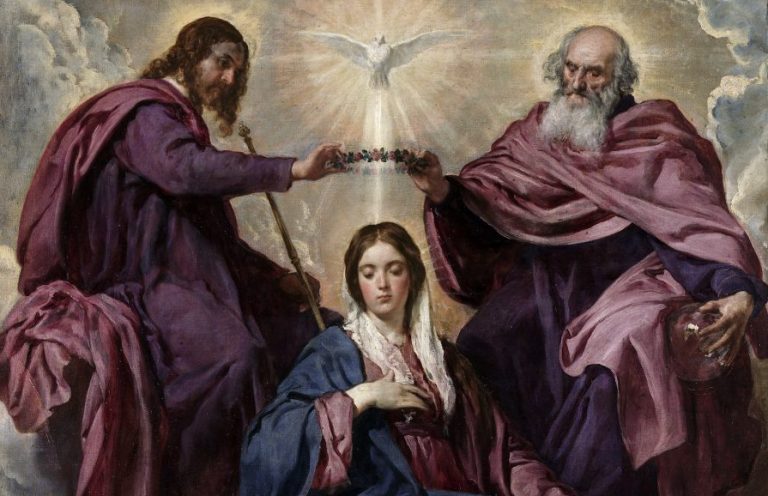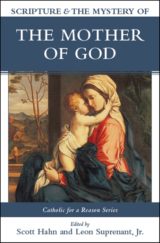By Scott Hahn
Scott Hahn, founder and president of the St. Paul Center, is a world-renowned scholar, speaker, and author. He is the best-selling author of over forty books on the Catholic faith.

I recall the days when I was still in a sort of spiritual “no man’s land” between my Evangelical past and my eventual home with Rome. I could no longer honestly preach as a Protestant minister, but I still had lingering doubts about Catholic doctrine. One by one, however, my doubts fell away as I studied Catholic theology and tradition until, finally, only the Marian doctrines remained.
These were substantial obstacles for me. Cradle Catholics often have no idea of the repugnance “Bible Christians” feel for Marian doctrines and devotions. It was then that someone mailed me a plastic rosary. As I opened the package, I felt I was facing the toughest obstacle of all. Yet, by that time, so many doctrines of the Catholic Church had proven to be biblically sound that I decided to step out in faith on this one. I began, hesitatingly, to pray my first Rosary, offering it for a specific intention, a situation that seemed hopeless by human standards.
Wonder of wonders, my prayers were answered. That seemingly impossible situation was completely reversed. This was success far beyond my expectations. I was astonished.
Still, a greater miracle was under way, one that was revealed to me by a conversation with an old friend from college. He knew me when I was most ardently anti-Catholic, and he had been watching my Romeward journey with increasing alarm. One day he called and cut right to the point: “So, Scott, are you worshiping Mary yet?”
“C’mon, Chris. You know that Catholics don’t worship Mary. They simply venerate her.”
“Really, Scott, what’s the difference? There’s no biblical basis either way.”
I began fingering my rosary beads, and I was emboldened. I proceeded on biblical principles. First, I reminded Chris that, as a man, Christ fulfilled God’s law perfectly, including the commandment to honor one’s father and mother. The Hebrew word for honor, kabbed, literally means “to glorify.” So Christ didn’t just honor His Heavenly Father. He also perfectly honored His earthly mother, Mary, by bestowing His own divine glory upon her.
Our veneration of Mary, then, is an essential part of our imitation of Christ. We follow Him not just by honoring our own mothers, but also by honoring whomever He honors—and with the same honor that He bestows.
Here was the greater miracle I gained through the Rosary. From that moment, I sensed how praying the beads deepened my own theological penetration of Scripture. Mary was no longer an obstacle to faith; she was opening its mysteries to me.
Jesus announced the Gospel, and then proceeded to fulfill it. But the Gospel did not change the Second Person of the Trinity. The eternal Son did not gain a single drop of glory for Himself—after living, dying, and rising as man—that He lacked beforehand. God did not create and redeem the world in order to get more glory, but rather to give it. There is no tug-of-war between the Creator and His creatures. The Father made and redeemed us through the Son and the Spirit, but They did it for us—starting with Mary, in whom it was accomplished not only first, but best.
Do we detract from Christ’s finished work by affirming its perfect realization in Mary? On the contrary, we celebrate His work precisely by focusing our attention on the human person who manifests it most perfectly.
Mary is not God, but she is the Mother of God. She is only a creature, but she is God’s greatest creation. Just as artists long to paint one masterpiece among their many works, so Jesus made His mother to be His greatest masterpiece. To continue the metaphor: No artist is offended when we praise his greatest work. In fact, he might be offended if we don’t. To affirm the truth about Mary does not detract from Jesus, although not to affirm it could.
Mary is directly related to God by a natural bond of covenant kinship, as the Mother of Jesus, to whom she gave her own flesh and blood. This bond is what enables us to share the New Covenant grace of Christ by adoption. Furthermore, Jesus is legally bound by His Father’s law (“Honor your father and mother”) to share His honor with Mary, as her Son. Indeed, He fulfilled this law more perfectly than any son has ever done, by bestowing the gift of His divine glory upon her. And we are simply called to imitate Him.
You Might Also Like
 Mary. Who is this hidden and humble woman? Her yes to God’s plan changed the world forever. Yet for many, this quiet Mother remains a controversial and ambiguous figure. Catholic for a Reason II: Scripture and the Mystery of the Mother of God explores the mystery of Mary, the Mother of God, through the personal study and reflection from well known Catholic authors including Scott and Kimberly Hahn, Curtis Martin, Tim Gray, and more.
Mary. Who is this hidden and humble woman? Her yes to God’s plan changed the world forever. Yet for many, this quiet Mother remains a controversial and ambiguous figure. Catholic for a Reason II: Scripture and the Mystery of the Mother of God explores the mystery of Mary, the Mother of God, through the personal study and reflection from well known Catholic authors including Scott and Kimberly Hahn, Curtis Martin, Tim Gray, and more.